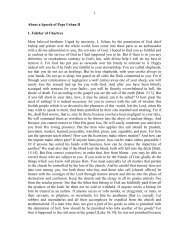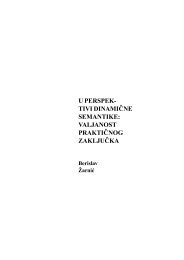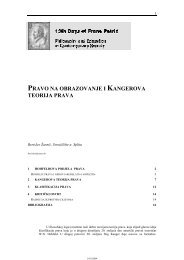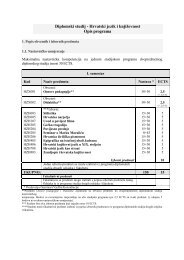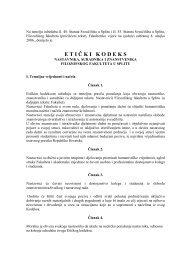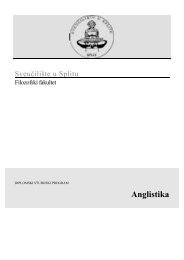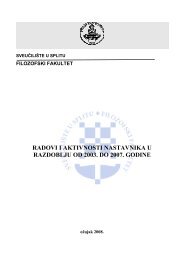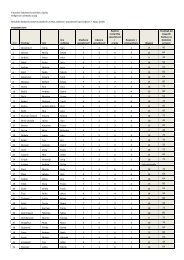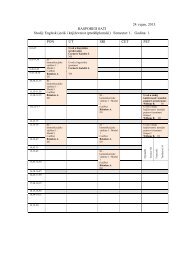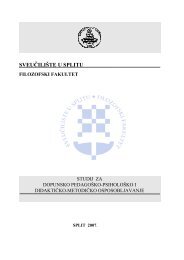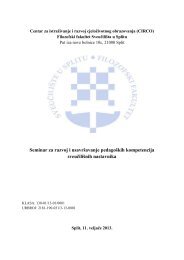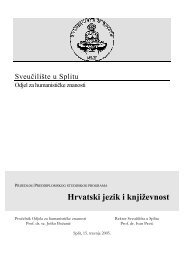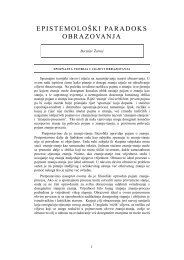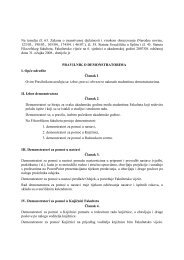English Studies
English Studies
English Studies
You also want an ePaper? Increase the reach of your titles
YUMPU automatically turns print PDFs into web optimized ePapers that Google loves.
G R A D U A T E D E G R E E P R O G R A M M E : E N G L I S H S T U D I E S<br />
Name of lecturer Prof. Dr Šime Pilić<br />
Learning<br />
outcomes and<br />
competences<br />
Through an active and creative participation in this course the future<br />
teachers will acquire knowledge with regard to 1. the correlation of the<br />
education sub-system and the global social system, 2. the social foundation<br />
of their profession. They will also master the method of analyticalsynthetical<br />
observation of education process and institution in the<br />
contemporary society. This course, being a part of educational sciences,<br />
significantly contributes towards obtaining the teacher’s competence, as<br />
well as a number of other competences: instrumental skills (analysis,<br />
synthesis, practical conveying of knowledge, problem solving);<br />
interpersonal skills: (criticism and self-criticism, team work, appreciation<br />
and respect for differences and multicultural values); system skills:<br />
(practical application of knowledge, research skills, adjusting to new<br />
situations, quality maintenance); special skills: (analysis of education<br />
concepts and policies, adjusting to new principles, questioning of ideas<br />
present in education studies, understanding of education system structures,<br />
understanding and respect for both pupils/ students and fellow teachers, as<br />
well as readiness to adjust to the varying circumstances).<br />
Prerequisites Completed requirements for enrolling in graduate study (teacher education).<br />
Prerequisites defined by the Faculty Statute.<br />
Course contents THEORETICAL AND HISTORICAL SURVEY. Genesis and development<br />
of sociology of education. Sociological approach and relevant theoretical<br />
concepts of education. SOCIAL CONTEXT OF EDUCATION. Historical<br />
and social prerequisites (work, industrialisation, modernisation). Social<br />
inequalities as reflected upon education. Socialisation. Conflicts. Role of<br />
family. School. INSTITUTIONALISED EDUCATION SYSTEM. School<br />
as a contemporary trend and its functions. University through history and<br />
today. Education and ideology. School system in the Republic of Croatia.<br />
EDUCATION AND SOCIAL CHANGES. Education and social mobility<br />
(stratification, mobility, differentiation, selection). Education and social<br />
reproduction (sexual, professional). Identity and education in the<br />
globalisation and European integration processes. SOCIOLOGY OF THE<br />
TEACHING PROFESSION. Sociology of profession. Socioprofessional<br />
group: primary and secondary school teachers, university teachers.<br />
EDUCATION AND CULTURE. Education and democracy. Environment<br />
issues in education. Religion culture. Education and multicultural society.<br />
Multiculturalism, interculturalism and education. EDUCATION AND<br />
TECHNOLOGICAL CHANGES. Modernisation and changes in education.<br />
Recommended<br />
reading<br />
Changes in modern society and reforms of education. Alternative education.<br />
Cifrić, I. (1990). Ogledi iz sociologije obrazovanja. Zagreb: Školske<br />
novine.<br />
Flere, S. (1986). (Ed.). Proturječja suvremenog obrazovanja. Zagreb:<br />
CDD. Haralambos, M., Holbron, M. (2002). Obrazovanje. U knjizi<br />
Sociologija: Teme i perspektive. (773-882). Zagreb: Golden marketing.<br />
Pilić, Š. (2000). Regrutiranje srednjoškolskih profesora u postsocijalističkoj<br />
Hrvatskoj. Život i škola, 46, 3, 51-64.<br />
70



